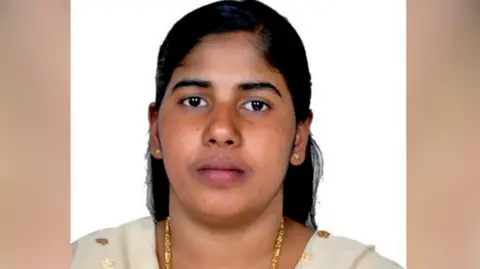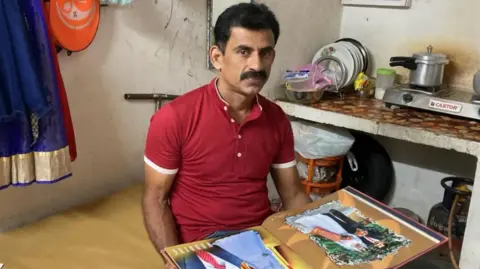 The BBC
The BBCFamily members of an Indian nurse on death row in war-torn Yemen say they are pinning their hopes on a last-ditch effort to save her.
34-year-old Nimisha Priya was sentenced to death for the murder of a local man – her former business partner Talal Abdo Mahdi – whose dismembered body was found in a water tank in 2017.
Housed in the capital Sanaa's central prison, she will soon be executed, with Mahdi al-Mashat, president of the Houthi rebels' Supreme Political Council, approving her punishment this week.
Under the Islamic justice system known as Sharia, the only way to stop an execution now is to secure a pardon from the victim's family. For months, Nimisha's relatives and supporters have been trying to do this by collecting diya, or blood money, to be paid to Mahdi's family, and negotiations are underway.
But as time passes, supporters say their hopes rest entirely on the family's decision.
With the presidential sanction coming, prosecutors will again seek the consent of Mahdi's family and ask if they have any objections to the execution, said Samuel Jerome, a Yemen-based social worker who holds a power of attorney on behalf of Nimisha's mother.
“If they say they don't want or can pardon her, the sentence will be suspended immediately,” he said.
“Forgiveness is the first step. Whether the family will accept the blood tribute comes only after that.”
Under Yemeni law, Nimisha's family cannot contact the victim's family directly and must hire negotiators.
Subhash Chandran, a lawyer who has represented Nimisha's family in India in the past, told the BBC that the family had already raised $40,000 (£32,268) for the victim's family. The money has been given in two tranches to lawyers hired by the Indian government to negotiate the case (the delay in sending the second tranche has affected negotiations, Mr Jerome says).
“We now have to explore the possibilities of discussions with (the victim's) family, which is possible only with the support of the Indian government,” Mr Chandran said.
India's Ministry of External Affairs said it was aware of Nimisha's situation and was providing all possible assistance to the family.
Her family is worried, but also hopeful.
“Nimisha doesn't know what's going on outside the prison gates,” said her husband, Tony Thomas, who spoke with her hours before the death sentence was approved. “The only thing she wants to know is if our daughter is okay.
Nimisha's mother is currently in Sana'a after traveling there last year following a trial in India allowed for her to go to the area controlled by the Houthi rebels. Since then, she has met her daughter twice in prison.
The first meeting was very emotional. “Nimisha saw me… she said I had become weak and asked me to be brave and that God would save her. She asked me not to be sad,” her mother Prema Kumari told the BBC.
The second time, Ms. Kumari was accompanied by two nuns who offered prayers for her daughter in prison.

Nimisha was only 19 years old when she went to Yemen.
The daughter of a poorly paid domestic worker, she wanted to change her family's financial situation and for several years worked as a nurse in a public hospital in Sana'a.
In 2011 she returned home – the southern Indian city of Kochi – and married Mr Thomas, a tuk-tuk driver.
The couple moved to Yemen together soon after. But financial difficulties forced Mr Thomas to return to India with their young daughter.
Tired of low-paying hospital jobs, Nimisha decided to open her own clinic in Yemen.
Since the law there required her to have a local partner, she opened the clinic together with Mahdi, a shop owner.
Initially, the two were on good terms – when Nimisha briefly visited India for her daughter's christening, Mahdi accompanied her.
“He seemed like a nice guy when he came to our house,” Mr Thomas told the BBC.
But Mahdi's attitude, Mr Thomas argued, “suddenly changed” when civil war broke out in Yemen in 2014.
At the time, Nimisha was trying to finalize the paperwork so that her husband and daughter could rejoin her.
But after the war broke out, the Indian government banned all travel to Yemen, making it impossible for them to go to be with her.
In the following days, thousands of Indians were evacuated from the country, but Nimisha chose to stay as she had taken out huge loans to open her clinic.
 Getty Images
Getty ImagesAt that time, Nimisha began to complain about Mahdi's behaviour, including allegations of physical abuse, Mr Thomas said.
A petition in court filed by a group called Save Nimisha Priya International Action Council alleged that Mahdi grabbed all her money, seized her passport and even threatened her with a gun.
After Mahdi's body was found in 2017, police accused Nimisha of murdering him by giving him an “overdose of sedatives” and allegedly dismembering his body.
Nimisha denied the allegations. In court, her lawyer claimed that she tried to anesthetize Mahdi just to get her passport from him, but the dose was accidentally increased.
In 2020 a local court sentenced Nimisha to death. Three years later, in 2023, her family challenged the decision in Yemen's Supreme Court, but their appeal was rejected.
Even with so many twists and turns, the family is unwilling to give up hope.
“My heart says we can reach an agreement and save Nimisha's life,” Mr Thomas said.
More than anything, he said, he worries about their daughter, now 13, who has “never experienced a mother's love”.
“They talk on the phone every week and my daughter gets upset if she misses the call,” Mr Thomas said.
“She needs her mother. What will she do without her?”
Follow BBC News India Instagram, youtube, Twitter and Facebook.

